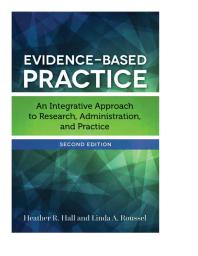What is Evidence-Based Practice?
Evidence-based practice (EBP) is a problem solving approach to clinical practice and decision making within healthcare. EBP integrates a systematic search for and critical appraisal of the most relevant evidence to answer a clinical question, personal clinical expertise, and patient preferences and values (Melnyk & Fineout-Overholt, 2014). The EBP process allows the practitioner to assess research, clinical guidelines, and other information resources based on high quality findings and apply the results to practice.
Source: AMSN, Evidence-Based Practice

Steps in Evidence-Based Practice
The following are the basic key concepts of evidence-based practice:
- Ask a clinical question
- Search the published literature
- Appraise the articles
- Integrate the findings into your practice
- Evaluate the results
- Disseminate (share) your findings
Evidence-Based Practice Tutorial
Duke Health has created an Evidence-Based Practice Series for health care practitioners and students to provide a basic introduction to the principles of Evidence-Based Practice. The tutorial consists of six modules.
A text-based version of the tutorial is also available.
Additional Resources
-
Johns Hopkins Evidence-Based Practice for Nurses and Healthcare Professionals: Model and Guidelines, Fifth Edition by
ISBN: 9781646481880Publication Date: 2024-12-15Unlimited User Access -
 Evidence-Based Practice
by
ISBN: 9781284098778Publication Date: 2016-08-15Limited User Access (1 copy)
Evidence-Based Practice
by
ISBN: 9781284098778Publication Date: 2016-08-15Limited User Access (1 copy)
-
Evidence-Based Medicine ToolsEBM tools for the five stages of Evidence-Based Medicine, from the University of Oxford
-
Evidence-Based Practice from AMSNThe Academy of Medical-Surgical Nurses (AMSN) values evidence based practice (EBP) as a way to affect best patient care. This site provides information on EBP, including modules and web resources.
-
Evidence-Based Practice Toolkit for NursingFrom Oregon Health & Science University
-
Evidence-Based Practice TutorialThis self-guided tutorial from Duke University Medical Center Library provides an introduction to EBP
-
Forming Focused Questions with PICOLearn how to form a clinical question using the PICO method. From UNC Health Sciences Library.
-
Trip - Clinical Search Engine Trip is a clinical search engine designed to allow users to quickly and easily find and use high-quality research evidence to support their practice and/or care.
PICO Questions
In Evidence-Based Practice, the formulation of a good clinical question is crucial to your research. The PICO model can help with formulating well-built clinical questions.
P = Patient, Problem, or Population
How would you describe a group of patients similar to you? What are the most important characteristics of the patient?
I = Intervention, Prognostic Factor, or Exposure
What main intervention, prognostic factor, or exposure are you considering? What do you want to do with this patient?
C = Comparison
What is the main alternative to compare with the intervention?
O = Outcome
What are you trying to accomplish, measure, improve, or affect?
For additional help with using PICO to form clinical questions, check out these resources: